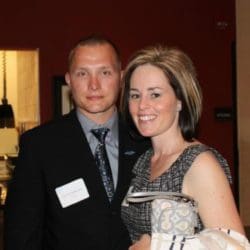We make it look easy, but it’s not.
What does being a military caregiver mean to you?
Being a military caregiver means that despite my husband’s significant injuries, he is going to live in such a way that his life is neither defined nor limited by his injuries. As his caregiver, I will do whatever I have to do to ensure that this occurs, whether it means that I navigate and provide assistance with his daily routine, or whether it means I have to reorganize and adjust the means in which our family operates. My husband will not live a life filled with regret because of what he survived in Iraq.
What do you think is the biggest misconception civilians have about your situation?
We make it look easy, but it’s not. From the outside looking in, people assume that our lives are like their own, but until you live with someone and are a caregiver for someone who has sustained the injuries that my husband has, you cannot fully grasp the daily impact these injuries have on our lives. I often say that if you make it look easy, if you make it so that people who are unaware of his injuries are shocked when they learn of them, then you are doing your job. I refuse to allow my husband to be stigmatized by his injuries or abilities; therefore, sometimes we have to fake it until we make it, and that is okay with me.
How do you find strength in the difficulty of your day-to-day?
There’s no other option other than to find the strength. I have never been one to have a pity party for myself. I do not feel sorry for myself. Our lives are what they are, and we cannot change the roads that have led us here.

My Story
In 2005, their first year of marriage and Sami's second year of law school, her husband, Garrett, sustained severe injuries as a result of an improvised explosive device (IED) that detonated under his Humvee during a night mission in Iraq. In the blast, Garrett lost his right arm, suffered severe head and facial injuries, and would later be diagnosed with a traumatic brain injury (TBI). When he was being treated for his injuries at Walter Reed National Military Medical Center, Sami was faced with not only working remotely, but also transferring to and attending a new law school in Washington, D.C. Sami's goal was to be with Garrett through his recovery and her support was paramount to his ability not only to heal and adjust to his injuries, but to his ability to recognize that a changed life does not constitute a bad life. Sami eventually achieved her law degree, and Garrett and her have been married for over 10 years and have two beautiful daughters. In her legal career, she has incorporated pro bono legal services to veterans.
Sami brings to the Elizabeth Dole Fellows program a determination to share her experiences in the hopes that she can convey that no matter what happens, no matter how difficult a situation seems, you can push through it and you can not only survive, but you can thrive.









